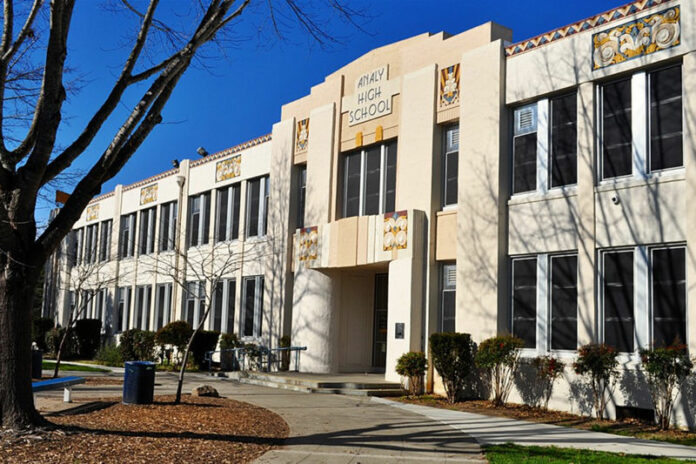On Thursday, Sept. 24, the WSCS Community Action Coalition hosted a candidate forum over Zoom for the candidates running for the West Sonoma County Unified High School District (WSCUHSD). There are two open seats and four candidates, none of which are incumbents. The four candidates running are Laurie Ann Fadave, Julie Aiello, Kyle O’Connor and Lynn Schallebaum Gleeson.
Adam Parks served as the moderator and Jerod Brown, a teacher and football coach at El Molino High School, ran the tech side of the meeting.
The tone of the forum was a friendly one, with all of the candidates expressing mutual admiration for each other. When asked to introduce themselves and say why they were running, some common themes emerged.
Fadave taught for 40 years, 17 of them at Analy, and is the mother of five Analy graduates.
“Education is more than a tool to teach people to gain knowledge, it’s a tool for understanding and gaining respect for themselves and the diversity of the world in which we live,” she said. “A trustee has to respond to the entire community, and the school board must partner with faculty and staff to ensure all students are informed by a partnership with stakeholders in the community.”
Aiello is also a retired teacher, spending 31 of her 34-year career at Sebastopol Elementary School. She was also the local union president for eight years.
“I would like to be on school board because I think it’s important to improve communication between teachers, parents, faculty and administration. I would like to see that be a much more positive part of the development process at the high school and I’d like to see three fantastic high schools in the district that are supported in their individual needs and programs,” she said. “I also want to see the budget managed in a fiscally-responsible manner that is in the best interest of all students and make sure the high schools are schools children want to come to and teachers want to come to and teach and stay.”
Gleeson is an Analy grad, who spent most of her professional life as a nurse working in and with schools, primarily providing support to medically fragile students. However, she also has a 10-year stint working with schools in the field of communicable disease, a point of interest to her given the current pandemic.
“(As a trustee I would) look to coordinate with teachers and the community to get unbiased information, analyze it and make an unbiased decision,” she said. “I’m trying to solve some of our problems as we have budget that is not good and in the future, we need to come up with solutions without endangering education for our community.”
O’Connor is the only candidate with direct ties to El Molino High School, as one of his children graduated in 2020 and the other is a sophomore there. He is the owner of a local manufacturing business and is an Air Force veteran and served on the board of the Russian River Fire Protection District. He touts his experience working with governmental and non-governmental budgets as the reasons he thinks he could be useful to the district.
“I’m interested in being on the school board primarily because of the budget issue and what seems to be a continuing challenge that never gets resolved. Some of the reasons for that are large and at a higher level but some can be dealt with at this level. We need to have strategic, long-term planning,” he said. “I find myself to be center-left, open-minded and I like to solve problems. Others’ ideas are like nutrient rich soil for solutions, and you have to be willing to accept failures sometimes and try again.”
The big issues facing the district are related to dropping enrollment and a historic budget shortfall, which has led to discussions of consolidation within the district (potentially closing one or more of the high schools) and in all of west county (a study has been commissioned on the county level to see about consolidating the 11 west county school districts). Overarching these concerns is the extra challenge of the COVID-19 pandemic. Sonoma West Times & News has included below a selection of questions covered during the forum. Answers have been edited for length and clarity. A video of the complete forum can be viewed here, using the password 79%20cN+.
We find ourselves in unprecedented times. We already had a budget shortfall pre-COVID and now with that crisis it is sure to be worse. How do you plan to approach the current crisis?
O’Connor: It’s a time of incredible decline and dwindling tax revenue because of COVID and it remains to be seen whether this will be short term or if it will have long-term effects. From the school district’s perspective, we have to be prepared. If we have to run certain programs, then we have to have revenue to run them. We can raise more revenue, through taxes, funds, whatever or we can manage it by lowering services. I don’t like that idea, I don’t think anybody likes that idea, so then we look at something like value engineering to try to trim and pull out that last bit of energy to get through this last gap of difficulties. We have to do something hard, hoping to get somewhere better, but it’s a really difficult task. I don’t want to downplay it as some simple thing, it’s going to take a lot of work.
Fadave: The tremendous issue facing us is because of declining enrollment and loss of revenue because of COVID. I don’t know what all questions we are facing going forward, let alone the answers, but I’m a problem solver and willing to work hard through these options. We need to put a variety on the table and need to look at best way to preserve education for the district going forward.
Aiello: In schools, you have to make a budget before you know what money you have, and that is always a challenge. How do you keep education programs that are best for the kids and make sure that staff is in a position where they can stay where they are and continue to teach? We have to work with parents and teachers to make sure budget cuts, if there have to be cuts, stay away from programs and make sure the educational program at each site is maintained as much as possible and at a high quality.
Gleeson: This whole COVID thing has brought on new budgetary things in difficult times … for schools we have to be looking at priorities. What’s the most important for the students, then teachers? What are the priorities for the students attending our schools? What can we do to bring more in? Declining enrollment has been going on for a while … (and the) difficulty of bringing kids to the schools means focusing on extracurricular programs, like music and drama. With the cooperation of everyone, we can look to the future and have a balanced budget down the line, but it’s not good if we don’t start looking at feasibility studies and what we can do about the budget, because it’s in serious trouble.
West county is known for diverse elective options through offering seven periods (an option that was cut due to budget problems). Are you in favor of a seven-period day and how do we balance the need for elective-rich programs with shrinking enrollment?
Gleeson: (I’m) in favor for the seven periods, I like the opportunity for students to have the electives and it also works well for students who want to graduate early or increase their college credits. The idea of keeping seven subjects or electives is really important to me, but we have to look at budget and priorities.
O’Connor: The canary in the coalmine is when programs are being cut. We know these programs help kids cognitively and makes a difference, so we want to defend them, but we might have to think about innovative ways. (One possibility) might be to have different campuses specializing in one area with one program and then moving students to those programs. (Because of COVID and distance learning) we’re realizing that education is more dynamic now and that we have to think outside the box what we can do physically … to keep diverse programs, but locating them in a singular space.
Fadave: I think everybody realizes we’re facing declining enrollment, (but) kids do not come to school for the required classes, they come for electives. I’m in full in support of a seven- period day … (We) can attract students if we have richer offerings. I’d love to run the numbers to see if we started losing students when we started cutting electives. It’s the electives they miss during COVID … we need to enrich the programs however we can do it and keep a seven-period day.
Aiello: The education experience needs to be as creative and full as humanly possible … there are creative ways to keep that going, including things we’ve done in past like sharing teachers with neighboring districts. The more kids in the community to learn and be enriched the better. I’m totally in favor of keeping seventh period and having kids have as rich an education as humanly possible. As far as declining enrollment, we get a lot of kids from outside the district, and I would like to see that encouraged and continue.
As we look to solve the budget shortfall there are discussions of consolidation. What is your position?
Aiello: I think whenever we’re looking at budget problems everything needs to be on table, but I’m very concerned with closing schools … I like to look at all options and make best one for the kids. I like the idea of keeping schools open and if possible, all three high schools, because the more options you have for parents the better it is for everybody. I’d like to see three fantastic high schools that are encouraging different types of kids to come … Consolidating the smaller districts I think is a definite possibility that should be looked at and considered.
Gleeson: In terms of shutting down schools, I don’t want to see it. The feasibility study that’s been asked for may give us some solutions, and we certainly have to look at it, and with the present state of less enrollment and budget we certainly may have to look at it, but my last choice would be to close down a school. Each have their uniqueness and programs and I think that would do our community a disservice if we shut down any of the schools. My goal would be to look at the study, see the options, talk to the community about ways to get more funding or sharing teachers, but certainly the last resort would be shutting down any school.
O’Connor: Everything should be talked about; every idea no matter how extreme or conservative, should be discussed. You never know what nuggets might be there but, generally, I’m against the idea of closing. But some schools can specialize in certain things and … it’s not going to be as expensive to maintain redundancy. There are a lot of ideas that can be reviewed on how to do more with less. If we can’t do more with less, then we can’t have the three schools … We have to think outside of box. We’re in a special time and have a special opportunity to be forced to think outside of box in how we do everything. We have to see it as an opportunity because it’s a challenge and we have to be successful. What’s at stake is the bedrock of society, a bunch of kids without direction or challenge and that’s planting seeds of destruction.
Fadave: I’d love to keep all three. Currently, all are unique, and all serve unique communities and have their own strengths, but we do need to take a look at the budget crisis we are plummeting towards. There may be ways of balancing things and maintaining all three. We are looking at two types of consolidation, the high schools and also consolidating all 11 districts in west county. There are 6,000 students in west county in 11 districts and there are a variety of different ways of being able to take a look at what works best. We can do something proactively to maintain the high schools and cut top heavy administration. (When district consolidation was) first proposed in 2006 it was voted down, however times have changed, and we’ve lost 12% of our enrollment … We need to find solutions, and we need to maintain everything we can of our culture in the high schools.









